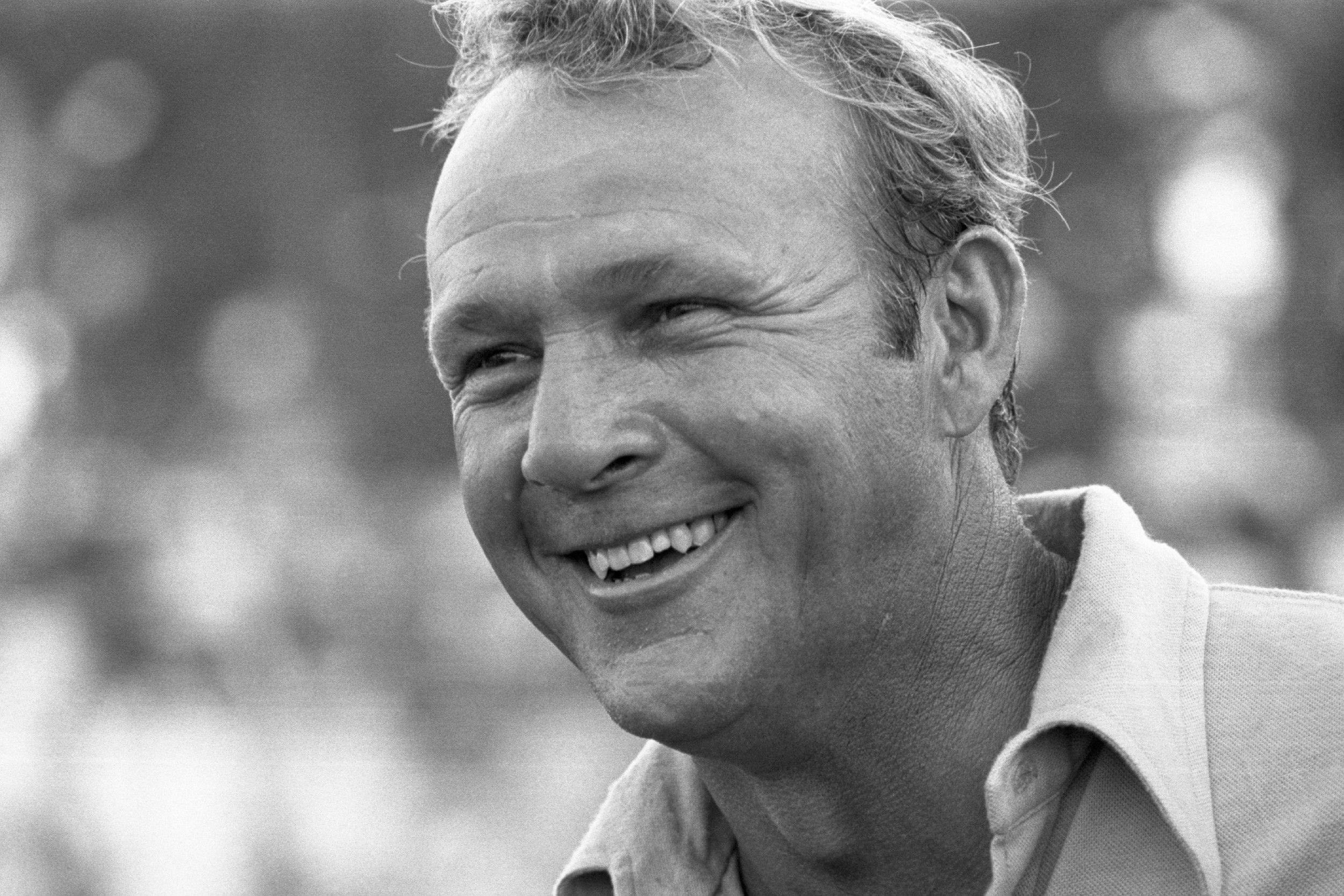By Geoff Shackelford and Joe House
The tributes are flowing and so are the tears. Arnold Palmer meant everything to golf. But few realize what he meant to the business of sports. More than Michael Jordan, Phil Knight, Peyton Manning, Tiger Woods, and even more than his highness, King LeBron James of Cleveland, Palmer was invaluable to translating not just his game, but all games, into our daily lives.
His passing at 87 on Sunday evening has already elicited the always-awkward declaration that golf would be nowhere had Arnold Daniel Palmer not come along. It’s a silly suggestion: Bobby Jones got Warner Bros. to fund a series of films at the start of the Depression, not long after he’d experienced the same ticker-tape parades and Time magazine covers that Ben Hogan would enjoy during the 1950s. Walter Hagen convinced America that pro golfers were more than just gambling degenerates. And Sam Snead showed people that golfers were athletes long before Palmer and his forearms started slashing at the ball like no one had ever seen.
The genius of Palmer was less in winning seven majors, 62 PGA Tour titles, and 10 times on the senior tour — a circuit he validated with his presence — but instead in combining the best attributes of his golfing predecessors with a saintly charisma that few humans have ever exuded. Someone else might have come along to revolutionize the sports business. But they didn’t.
And so yes, he made a fortune off his epic charm and his even more epic blend of masculinity and sensitivity. In attacking golf courses, signing more autographs than anyone else alive, and cashing in on off-course opportunities to the tune of hundreds of millions of dollars, the King still always made us feel like he was looking out for our best interests. Arnold Palmer reaffirmed our faith in sports as American life at its best, at its most interesting and, yes, its most profitable (at least among ventures not involving the shuffling of paperwork).
Palmer’s reign as the ultimate sports businessman started like one of his signature tee shots. He took a big swing and, after finding his shot in the woods, looked at the ball with much consternation and consultation before pulling off a daring recovery.
That lengthy back-and-forth in the woods, which he spent considering his options, would change the sports landscape forever. At the time, Palmer was wrapping up his amateur and Wake Forest careers, trying to figure out how he’d make a living. Mired in an exploitative contract with Wilson Sporting Goods after turning pro, Palmer finally agreed to let budding agent and future IMG magnate Mark McCormack represent him in off-course interests. Their partnership forever altered the landscape.


“No one in American sports has treated his audience better than Arnold Palmer,” Ben Crenshaw said on Golf Channel’s all-night coverage dedicated to the man.
A mention of Golf Channel is a reminder that you can’t write about Palmer long without veering off into another of his influences: specialized sports TV channels. The King and Joe Gibbs — not the football coach — were mocked for sinking millions into Golf Channel more than 20 years ago. The channel went on to usher in the wave of specialty sports channels and the “sub fees” that have made millionaires out of morons.
But back to the beginning of Palmer’s influence.
Like any great creative partnership, McCormack deserves as much credit as Palmer for changing how we view and trust athletes, yet it was the King’s package of charm, wit, intelligence, gut instinct, fashion sense, and physical grandeur that made the whole thing happen. Like any great artistic or business duo, McCormack brought a left-brain attention to contracts, math, and business while Palmer delivered a right-brain savvy, charisma, and big-picture vision. They were sports’ Lennon and McCartney or Jagger and Richards. Only they wore cardigans.
In Players, a landmark book released earlier this year, The Wall Street Journal’s Matthew Futterman tells “The Story of Sports and Money and the Visionaries Who Fought to Create a Revolution.” He traces the beginning of sports business as we know it to McCormack’s desire to “make life better for the athletes, but in doing so, he could make it better for everyone — leagues, team owners, athletic federations, and fans. That was [his] plan.”
But the vision came together only because Palmer offset McCormack’s left-brain ways with impeccable instinct. Remember, Palmer is the man who started blending iced tea and lemonade to a point that almost any minimum-wage-earning server in the United States knows what you mean when you order an “Arnold Palmer.” (Yet another reason Arnold Palmer is the King.)
Introducing his book, Futterman sums up the Palmer-McCormack impact on sports:
Futterman goes on to detail the genius of McCormack in seeing how athletes could sell products and earn real money for their talents. But it was Palmer — who came along when TV started transitioning to color and convinced people to rent from Hertz, buy a Rolex, pop a Xarelto, and mix their iced teas and lemonades — who made McCormack’s vision click.
So next time you order an Arnold Palmer, realize it was for the betterment of both refreshingly balanced libations and the athletes we love watching. Even at its most cutthroat and bizarre, sports occupies a place in our mind that is not just emotional, but cultural. It’s embedded in our daily life, in what we watch and what we buy, how we dress and where we go. It’s everywhere. And for that, we can thank the King.
